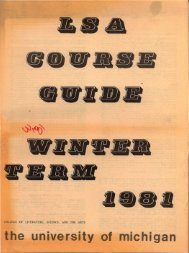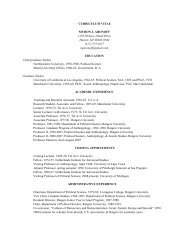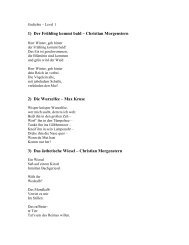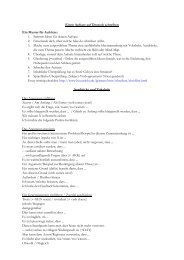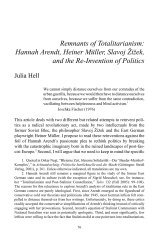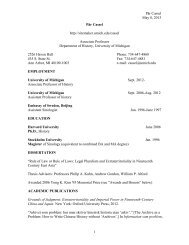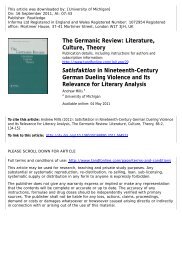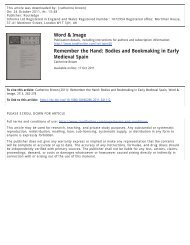Making History Personal: Constantine Cavafy and the Rise of Rome
Making History Personal: Constantine Cavafy and the Rise of Rome
Making History Personal: Constantine Cavafy and the Rise of Rome
You also want an ePaper? Increase the reach of your titles
YUMPU automatically turns print PDFs into web optimized ePapers that Google loves.
Frier, “<strong>Making</strong> <strong>History</strong> <strong>Personal</strong>,” page 37<br />
“Their hearing, / sometimes, in moments <strong>of</strong> complete / absorption in <strong>the</strong>ir studies, is disturbed.<br />
The secret call / <strong>of</strong> events that are about to happen reaches <strong>the</strong>m. / And <strong>the</strong>y listen to it reverent-<br />
ly. While in <strong>the</strong> street / outside, <strong>the</strong> people hear nothing at all.” In his early collection, <strong>Cavafy</strong><br />
set this poem in relation to o<strong>the</strong>rs depicting his subjects’ success, or lack <strong>of</strong> success, in discern-<br />
ing what was about to happen in <strong>the</strong> world around <strong>the</strong>m: Julius Caesar, elated by his victories,<br />
but failing to comprehend <strong>the</strong> portent <strong>of</strong> Pompey’s gory beheading (“Theodotus,” 1911), <strong>and</strong><br />
<strong>the</strong>n also ignoring a final warning on <strong>the</strong> very day <strong>of</strong> his assassination (“Ides <strong>of</strong> March,” 1906);<br />
Antony successfully interpreting <strong>the</strong> “exquisite music” <strong>of</strong> an “invisible procession” (“The God<br />
Ab<strong>and</strong>ons Antony,” 1910); <strong>and</strong> we may add <strong>the</strong> Emperor Nero’s smug failure to grasp <strong>the</strong> meaning<br />
<strong>of</strong> a Delphic prophesy (“Nero’s Deadline,” 1915), among o<strong>the</strong>r poems. 116 The “wise men,”<br />
<strong>the</strong> sophoi, are those individuals “who foresee <strong>the</strong> coming <strong>of</strong> dreadful things. They do not panic,<br />
nor do <strong>the</strong>y implore; <strong>the</strong>y underst<strong>and</strong>, st<strong>and</strong>, defend <strong>and</strong>, one suspects, even die. They are <strong>the</strong><br />
courageous still.” 117<br />
John Anton remarks that: “<strong>Cavafy</strong> never seems to have doubted <strong>the</strong> belief that <strong>the</strong> man <strong>of</strong><br />
wisdom is a better judge <strong>of</strong> actions than <strong>the</strong> common man. By opting for a wisdom that includes<br />
rational judgment as a guide <strong>and</strong> test <strong>of</strong> values, while illumining <strong>the</strong> dem<strong>and</strong>s <strong>of</strong> <strong>the</strong> desires, he<br />
118<br />
moves out <strong>of</strong> <strong>the</strong> shadow <strong>of</strong> Romanticism as well as that <strong>of</strong> symbolism.” It is against this<br />
background, I think, that we today must approach <strong>Cavafy</strong>’s historical poetry. <strong>Cavafy</strong> is justly<br />
famed for his success in creating a sort <strong>of</strong> surface c<strong>and</strong>or, with little metaphor or apparent artifice.<br />
My colleague Ruth Scodel has observed that: “<strong>Cavafy</strong>, unlike much Hellenistic poetry, is<br />
immediately accessible. The difficulties <strong>of</strong> Hellenistic poetry are a barrier right from <strong>the</strong> start: its<br />
language is difficult, <strong>the</strong> allusions are many, <strong>the</strong> social context is not always familiar, <strong>the</strong> narra-<br />
tive structures seem peculiar. <strong>Cavafy</strong>, in contrast, is easy on <strong>the</strong> surface … [its] implied narratives<br />
… not dem<strong>and</strong>[ing] deep learning to make an immediate impression.” 119<br />
However, as Scodel<br />
immediately goes on to note, <strong>Cavafy</strong>’s apparent openness is, at <strong>the</strong> very least, deceptive. In<br />
fact, what he wrote is learned poetry, informed by <strong>the</strong> rich Hellenistic traditions that <strong>Cavafy</strong> re-<br />
drus 278D. See Anton, Poetry <strong>and</strong> Poetics (1995) 319-320. On <strong>the</strong> background to <strong>the</strong> composition <strong>of</strong> this <strong>and</strong> <strong>the</strong><br />
o<strong>the</strong>r Apollonius poems, see Bowersock, “Apollonios” (1983/2009) 154-158.<br />
116<br />
See Mendelsohn, Collected Poems (2009) 374-375. This poem should also be read in relation to “Finished”<br />
(1910), which stresses <strong>the</strong> final futility <strong>of</strong> striving to “avoid <strong>the</strong> certain / danger that threatens us so terribly.”<br />
117<br />
Anton, Poetry <strong>and</strong> Poetics (1995) 258, citing also “Thermopylae” (1901).<br />
118<br />
Anton, Poetry <strong>and</strong> Poetics (1995) 319.<br />
119 Scodel, “Preface” (2003) 2.





